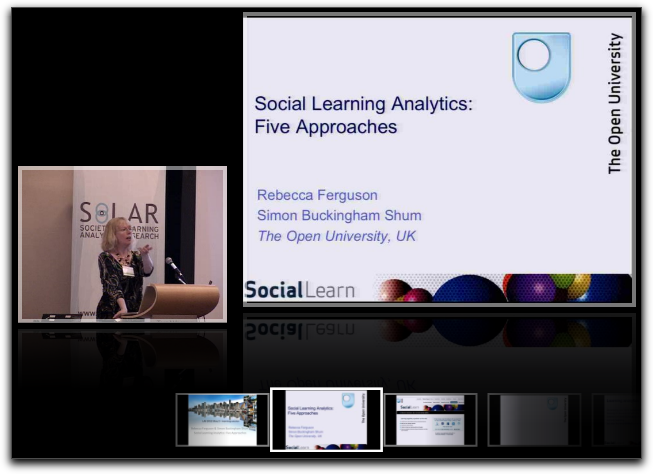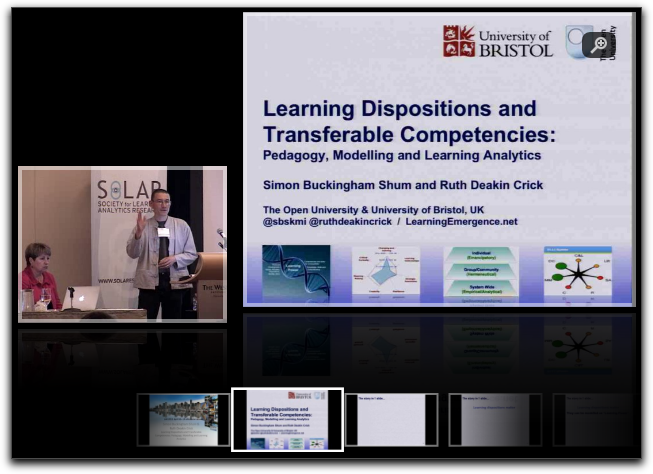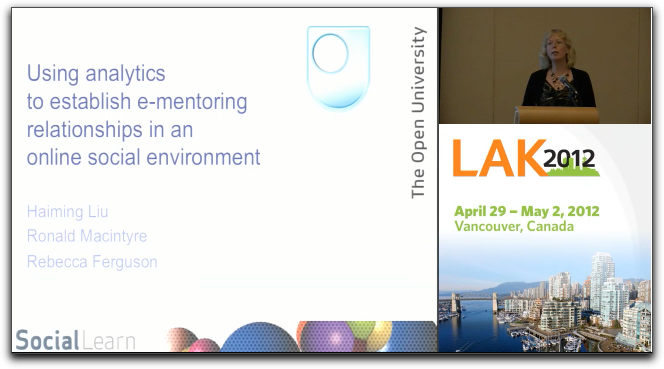March 2nd, 2012SocialLearn research @LAK12

The International Conference on Learning Analytics & Knowledge is the primary research forum on Learning Analytics. The research strand of SocialLearn will be contributing in several ways to LAK12.
- On the organisational front, Simon Buckingham Shum is Programme Co-Chair, and also co-leading a workshop on Connecting Levels and Methods of Analysis in Networked Learning Communities. As Workshops Chair, Rebecca Ferguson has oversight of the workshops programme, new to LAK this year.
- Simon and Rebecca serve on the executive and steering committees at the newly founded Society for Learning Analytics Research (SoLAR), which oversees the LAK conference, and which is hosting a Summit for educational thought-leaders and funders after LAK. This has excited huge interest from major players, and we’re at capacity now.
- As part of establishing itself as a new academic discipline, the LAK conference proceedings are in cooperation with the ACM, the world’s largest educational and scientific computing society, and in whose Digital Library all papers are archived (ACM LAK11 Proceedings). LAK therefore has a rigorous peer review process (more so than many other conferences) in which authors and reviewers debate through several iterations, before final decisions are made. So we’re very pleased that three papers made it through.
Ferguson, R. and Buckingham Shum, S. (2012). Social Learning Analytics: Five Approaches. Proc. 2nd International Conference on Learning Analytics & Knowledge, (29 Apr-2 May, Vancouver, BC). ACM Press: New York. Eprint: http://oro.open.ac.uk/32910
Abstract: This paper proposes that Social Learning Analytics (SLA) can be usefully thought of as a subset of learning analytics approaches. SLA focuses on how learners build knowledge together in their cultural and social settings. In the context of online social learning, it takes into account both formal and informal educational environments, including networks and communities. The paper introduces the broad rationale for SLA by reviewing some of the key drivers that make social learning so important today. Five forms of SLA are identified, including those which are inherently social, and others which have social dimensions. The paper goes on to describe early work towards implementing these analytics on SocialLearn, an online learning space in use at the UK’s Open University, and the challenges that this is raising. This work takes an iterative approach to analytics, encouraging learners to respond to and help to shape not only the analytics but also their associated recommendations.
Buckingham Shum, S. and Deakin Crick, R. (2012). Learning Dispositions and Transferable Competencies: Pedagogy, Modelling and Learning Analytics. Proc. 2nd International Conference on Learning Analytics & Knowledge. (29 Apr-2 May, 2012, Vancouver, BC). ACM Press: New York. Eprint: http://oro.open.ac.uk/32823
Abstract: Theoretical and empirical evidence in the learning sciences substantiates the view that deep engagement in learning is a function of a complex combination of learners’ identities, dispositions, values, attitudes and skills. When these are fragile, learners struggle to achieve their potential in conventional assessments, and critically, are not prepared for the novelty and complexity of the challenges they will meet in the workplace, and the many other spheres of life which require personal qualities such as resilience, critical thinking and collaboration skills. To date, the learning analytics research and development communities have not addressed how these complex concepts can be modelled and analysed, and how more traditional social science data analysis can support and be enhanced by learning analytics. We report progress in the design and implementation of learning analytics based on a research validated multidimensional construct termed “learning power”. We describe, for the first time, a learning analytics infrastructure for gathering data at scale, managing stakeholder permissions, the range of analytics that it supports from real time summaries to exploratory research, and a particular visual analytic which has been shown to have demonstrable impact on learners. We conclude by summarising the ongoing research and development programme and identifying the challenges of integrating traditional social science research, with learning analytics and modelling.
Haiming, L. Macintyre, R. and Ferguson, R. (2012). Exploring Qualitative Analytics for E-Mentoring Relationships Building in an Online Social Learning Environment. Proc. 2nd International Conference on Learning Analytics & Knowledge, (29 Apr-2 May, Vancouver, BC). ACM Press: New York. Eprint: http://oro.open.ac.uk/33632
Abstract: The language of mentoring has become established within the workplace and has gained ground within education. As work based education moves online so we see an increased use of what is termed e-mentoring. In this paper we explore some of the challenges of forming and supporting mentoring relationships virtually, and we explore the solutions afforded by online social learning and Web 2.0. Based on a conceptualization of learning network theory derived from the literature and the qualitative learning analytics, we propose that an e-mentoring relationships is mediated by a connection with or through a person or learning objects. We provide an example to illustrate how this might work.




May 9th, 2012 at 12:18 am
[…] Evolution or Revolution? There is a huge driver in certain countries for analytics to improve course completion rates. There is quite clearly an economic incentive for institutions, and one might have thought, for students. Some of the most impressive work which has excited a lot of interest has been in analytics which give students and tutors real-time feedback in the VLE, using predictive modelling of course completion based on online behaviour patterns and demographics. However, a debate broke out at LAK12, around whether course completion = real learning. There is concern that analytics are being recruited simply to reinforce the current educational paradigm with its traditional pedagogical approaches (often very weak). There is deep concern that our educational systems are not equipping students adequately for a world of unprecedented complexity (see FuturICT project!). There was much talk of looking under lamp-posts because that’s simply where it’s easiest to see with relatively impoverished computational lenses… The alternative — or complement? Perhaps analytics in support of more radical pedagogical models, based on theories of deep learning and the transferable ‘21st century competencies’ that our children, students and workforce need [my papers on this]. […]